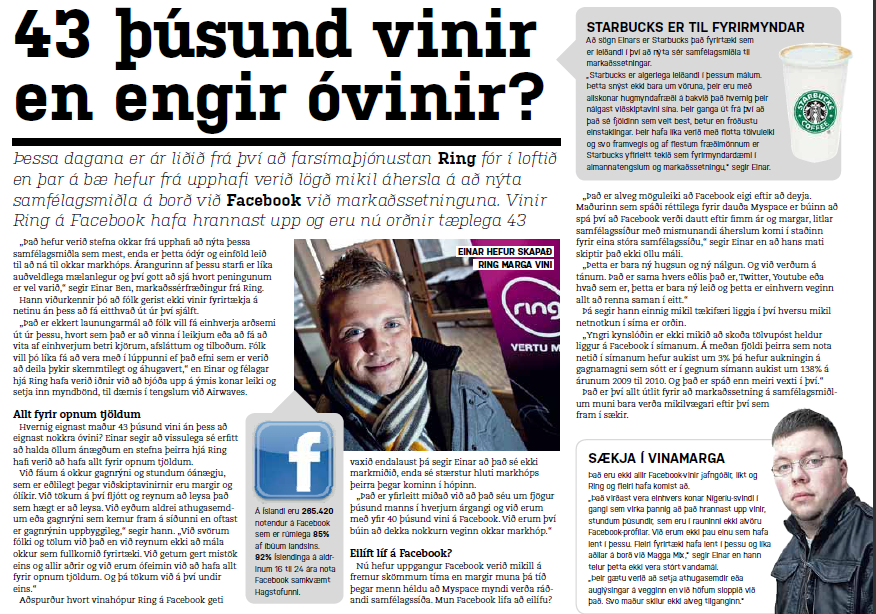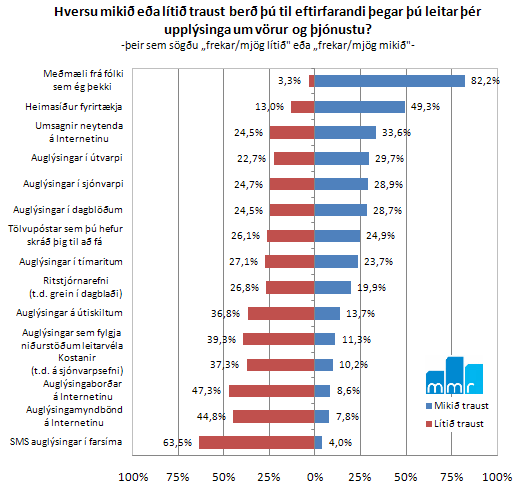Fęrsluflokkur: Markašssetning į netinu
Föstudagur, 26. nóvember 2010
Markašsstjóri Ring aš tala um samfélagsmišlana
Markašssetning į netinu | Breytt 25.11.2010 kl. 23:47 | Slóš | Facebook
Föstudagur, 19. nóvember 2010
Vištal viš stofnanda Facebook Mark Zuckerberg
Įhugavert vištal viš stofnanda Facebook, Mark Zuckerberg į Web 2.0 Summit 2010.
Markašssetning į netinu | Breytt 20.11.2010 kl. 03:23 | Slóš | Facebook
Föstudagur, 24. september 2010
Hvernig męlir žś įrangur markašsstarfsins ķ žķnu fyrirtęki.
Ķ jślķ gerši Deloitte könnun ķ Bretlandi ķ samstarfiš viš CIM į žvķ hvernig markašsstjórar eru aš meta įrangur vinnu sinnar.
Nišurstašan sżnir hlutfall markašsstjóra sem notar nešangreinda męlikvarša
- Customer Satisfaction = 70%
- Rate of customer acquisition = 60%
- Traditional media activity = 57%
- Customer Value and Profitability = 57%
- Cusomer retention = 54%
- KPI set for each initiative = 7%
- Consistent core strategic metric = 10%
Markašssetning į netinu | Breytt 23.9.2010 kl. 19:41 | Slóš | Facebook
Mišvikudagur, 22. september 2010
Markašsfólk athugiš - gildrur geta hjįlpa okkur aš stżra fólki
Markašssetning į netinu | Breytt 21.9.2010 kl. 22:55 | Slóš | Facebook
Föstudagur, 10. september 2010
Google Instant - uppfęrsla į leitarvélinni ķ vikunni - mikil breyting!
Markašssetning į netinu | Breytt s.d. kl. 09:14 | Slóš | Facebook
Mišvikudagur, 18. įgśst 2010
Ókeypis frįbęr bókakafli um branding frį Landor
Eftir aš hafa lesiš tvęr bękur eftir Allen Adamson hef ég fylgst ašeins meš Landor auglżsingastofunni. Stofan er meš frįbęrt blogg og helling af fróšleik į heimasķšunni sinni.
Žar er einnig aš finna žennan frįbęra bókakafla um Mörkun/Branding
http://www.landor.com/pdfs/k9/EssentialsBranding_9August10.pdf
Mišvikudagur, 14. jślķ 2010
Google veit hversu įhrifamikil(l) žś ert į Facebook!
 Google ętlar sér stóra hluti ķ auglżsingamįlum samfélagsmišlanna. Žeir eru nś bśnir aš fį einkaleyfi į algrķmu sem reiknar śt hversu mikils virši einstaklingar eru į samfélagsmišlunum. Žaš er aš segja, žeir eru komnir meš tękni sem metur hversu mikil įhrif hver einstaklingur į Facebook (sem dęmi) hefur į žį sem eru į vinalistanum (og vinalistum vina žeirra).
Google ętlar sér stóra hluti ķ auglżsingamįlum samfélagsmišlanna. Žeir eru nś bśnir aš fį einkaleyfi į algrķmu sem reiknar śt hversu mikils virši einstaklingar eru į samfélagsmišlunum. Žaš er aš segja, žeir eru komnir meš tękni sem metur hversu mikil įhrif hver einstaklingur į Facebook (sem dęmi) hefur į žį sem eru į vinalistanum (og vinalistum vina žeirra).
Ef žeim tekst aš selja įreiti sem er beint eingöngu aš žeim sem hafa mestu įhrifin, getur viršiš veriš grķšarlegt fyrir fyrirtęki sem eru aš reyna dreifa efni og upplżsingum.. Hugmyndafręšin er svipuš og PAGE RANK, sem Google notar viš einkunnargjöf į heimasķšum.
Ég lęt fylgja mjög įhugaverša grein um žetta śr Business Week :
,,Imagine there was one number that could sum up how influential you are. It would take into account all manner of things, from how many people you know to how frequently you talk with them to how strongly they value your opinion. Your score could be compared with that of pretty much anyone in the world.
Maybe it'll be called your Google number. Google has a patent pending on technology for ranking the most influential people on social networking siteslike MySpace and Facebook. In a creative twist, Google is applying the same approach to social networks it has used to dominate the online search business. If this works, it may finally make ads on social networks relevant--and profitable.
Google declined to discuss its idea with BusinessWeek. But it is based on the same principle as PageRank, Google's algorithm for determining which Web sites appear in a list of search results. The new technology could track not just how many friends you have on Facebook but how many friends your friends have. Well-connected chums make you particularly influential. The tracking system also would follow how frequently people post things on each other's sites. It could even rate how successful somebody is in getting friends to read a news story or watch a video clip, according to people familiar with the patent filing. "[Google] search displays Web pages with the highest influence--it makes complete sense for them to extend this to online communities and people," says Jeremiah Owyang, an analyst at Forrester Research
How would this improve advertising on social networks? Say there's a group of basketball fans who spend a lot of time checking out each other's pages. Their profiles probably indicate that they enjoy the sport. In addition, some might sign up for a Kobe Bryant fan group or leave remarks on each others' pages about recent games they played or watched. Using today's standard advertising methods, a company such as Nike would pay Google to place a display ad on a fan's page or show a "sponsored link" when somebody searches for basketball-related news. With influence-tracking, Google could follow this group of fans' shared interests more closely, see which other fan communities they interact with, and--most important--learn which members get the most attention when they update profiles or post pictures.
The added information would let Nike both sharpen and expand its targeting while allowing Google to charge a premium for its ad services. If Nike wanted to advertise a new basketball shoe, for example, it could work with Google to plop an interactive free-throw game only on the profile pages of the community influencers, knowing the game would be likely to draw the most attention in these locations. And because the new technique ranks links among groups, Google could also target the ads to broader communities. "I would pay a premium to get a particular video in front of someone who [shares] with others, and an even bigger premium for a lot of people who would share," says Ian Schafer, CEO of online ad firm Deep Focus, whose clients include Sean Jean and Universal Music Group.
Influence-ranking is no academic exercise for Google. So far the search giant has failed to earn much profit from social networking ventures. In 2006, Google promised to pay News Corp.'s MySpace $900 million over three years for the right to put ads on the site. Google executives have expressed disappointment in that project, which is shaving 1.5% off Google's gross margins, according to Jeffrey Lindsay, an analyst at Sanford C. Bernstein. In its patent filing, Google acknowledged that some of its old approaches didn't work. With the new techniques, says Deep Focus' Schafer, "Google could be the Google of social media."
Markašssetning į netinu | Breytt s.d. kl. 21:11 | Slóš | Facebook
Föstudagur, 25. jśnķ 2010
Google spįir ķ fasteigna- og bķlasölu / nįmskeiš ķ Markašssetningu į netinu
Google byrjaši fyrir įri aš spį fyrir um fasteigna og bķlasölu meš leitargögnunum sķnum. Žeir komust aš žvķ aš leitum fjölgaši žegar sala į bķlum almennt jókst. Leitunum fyrst en stuttu sķšar sölum.
Google er į žvķ aš žetta sé mun betri leiš til aš spį fyrir um sölu ķ framtķšinni en hefšbundnar söluspįr sem horfa eingöngu į eldri fyrirliggjandi gögn!
- - -
Skrįning į heilsdags nįmskeišiš okkar žann 19. jślķ ķ Markašssetningu į netinu gengur vel. Tękifęrin į netinu eru geysilega mikil og geta öll fyrirtęki nįš įrangir meš auglżsingum žar. Ennžį eru sęti laus - hér eru allar upplżsingar.
Žrišjudagur, 8. jśnķ 2010
Nż ķslensk könnun - hvaša samskiptamišlum treysta Ķslendingar?
Markašssetning į netinu | Breytt s.d. kl. 17:32 | Slóš | Facebook




